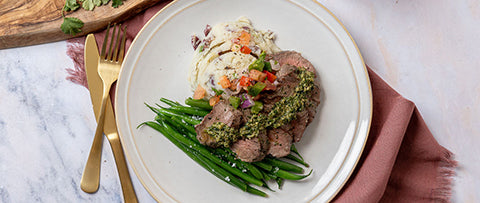What is protein?
Protein, along with carbohydrates and fat, make up our macronutrients. Macronutrients are the nutrients that our bodies need in higher quantities for energy.
Protein is made up of amino acids and found in every cell that we have in our body. It is used to build and repair muscles, bones, cartilage, fingernails, skin, and blood. Protein also supports digestion, blood clotting, growth, hormone production and immunity.
After protein is digested it moves to your small intestine where the amino acids are absorbed and released into your bloodstream. Once released into your bloodstream, the amino acids are sent to other parts of your body where they begin to build and repair muscles and tissues.
How much protein do you need?
According to the Academy of Nutrition and Dietetics, it is recommended that you take in 0.8g of protein per kg of your body weight. To find this:
Step 1: Find your weight in kg - (Your weight in lbs divided by 2.2)
Step 2: Multiply your weight in kg by 0.8
Example: 160lbs / 2.2 = 73kg x 0.8g = 58.4 grams/protein per day
It is important to remember that this calculation reveals the minimum amount of protein that a sedentary individual needs to function. Depending on your age, activity level, overall health, goals, digestion, and lifestyle, this amount of protein may not be enough to meet your body's needs. For example, if you are a breastfeeding mom, an athlete, vegan, or vegetarian, your body will require more protein.
Another way you can calculate your protein is by looking at your daily calories and setting your protein goal as 10-30% of your daily calories.
Tracking your food on an app such as MyFitnessPal makes this easy.
Good sources of protein
While protein powders and supplements are always an option, most people can get the amount of protein they need from real quality food.
- Poultry: Chicken, turkey, duck
- Lean meats: beef, lamb, pork
- Fish and seafood: fish, shrimp, crab, lobster, muscles, oysters, scallops, clams
- Dairy products: Milk, yogurt, cheese
- Eggs
- Nuts and seeds: Almonds, pine nuts, walnuts, hazelnuts, cashews, pumpkin seeds,
- Legumes and beans: All beans, lentils, chickpeas
Best ways to incorporate protein
Include a good quality protein with each meal
Making sure you have a protein at each meal will not only help you get in the habit of eating enough protein, but it will also help you practice portion control and ensure you are having a balanced meal.
Your plate should be approximately 1/4 complex carbohydrates, 1/4 lean protein, and 1/2 fresh fruits and vegetables along with 1-2 tablespoons of healthy fat.
Choose high protein snacks
Healthy snacking can help manage blood sugar levels, increase energy, reduce brain fog, and curb cravings. High protein snacks can help to keep you full and satisfied in between meals.
High protein snack ideas: Trail mix, greek yogurt, almonds, hard boiled eggs, peanut butter, tuna,
Eat protein immediately after exercise
Proteins are essential for muscle building and repair. After a workout your muscles are most sensitive and in need of nutrients they can use to repair. Ideally you want to eat a high protein meal or snack within an hour of finishing your workout.
Choose quality protein sources
When choosing sources of protein in your diet, quality is just as important as quantity. Lean, antibiotic and hormone free proteins are best.
While processed meats such as lunchmeat are sources of protein, they are often loaded with sodium and processed with substances that may put your health at risk if you consume them too often.
Incorporate plant protein into your diet
Whether you’re a vegetarian or not, incorporating more sources of plant protein in your diet can provide many benefits. In addition to being a good source of protein, plant protein foods such as beans, lentils, and quinoa are also rich in other nutrients like fiber, vitamins, and minerals.
Protein is one of the most important nutrients in your body. It helps to repair and maintain your tissues and muscles. Your hair, skin, fingernails, eyes, organs, and hormones are essentially made out of protein.
Everyone’s protein needs are different as they are based on age, activity level, overall health, goals, and lifestyle.
Quality foods are the best source of protein and can easily be added to your diet.






